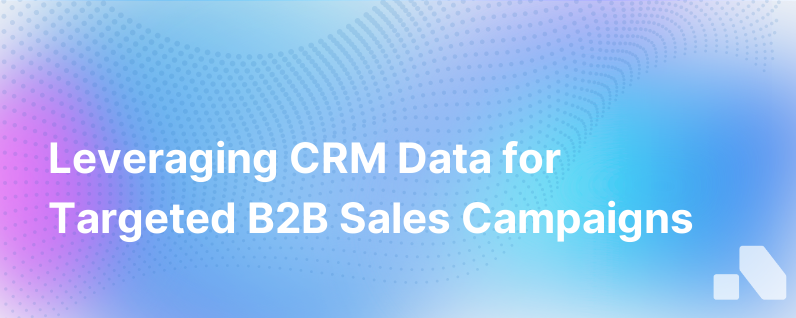
Creating highly targeted and strategic B2B sales campaigns has always been a key factor for success in the corporate world. However, the advent of sophisticated Customer Relationship Management (CRM) platforms has revolutionized the way B2B interactions and sales campaigns are conducted. When armed with insights gleaned from CRM systems, the power to not only reach but resonate with your target audience multiplies.
Below we outline the foundational steps and strategies for creating compelling, personalized, and ultimately successful B2B sales campaigns using the robust data and analytics provided by CRM systems.
Harnessing CRM Data
CRM systems are much more than simple databases. They are dynamic tools that aggregate detailed and nuanced data ranging from customer contact information to interactions, sales histories, campaign responses, and purchasing habits. Leveraging this data can give your campaigns a level of precision previously unreachable.
Here's a step-by-step guide to using CRM data for enhancing your B2B sales campaigns:
-
Data Collection and Management: To begin with, ensure your CRM is capturing the right kind of customer data. This should include:
- Basic firmographic data (industry, company size, location).
- Detailed interaction history (emails opened, links clicked, downloads, event participations).
- Purchase history and ongoing service or product uses.
- Notes from sales calls and customer service interactions.
-
Audience Segmentation: The next step is digesting this data into actionable segments. Segmentation can be done based on several factors, including:
- Purchasing behavior and history.
- Pain points and needs identified in previous interactions.
- Engagement with past marketing campaigns.
- Predicted customer value or potential for upselling.
-
Personalized Campaigns: Use the segments to tailor your campaigns. Personalization goes a long way in B2B sales. It can range from addressing the recipient by name to tailoring the content based on their industry, challenges, or specific interests.
-
Timing and Cadence: CRM analytics can help identify the best times to engage with different segments, as well as the ideal frequency of contact that maximizes engagement without overwhelming the prospects.
-
Automated Workflows: CRM systems often have automation capabilities. Utilizing these, you can set triggers to send out personalized messages when a prospect performs a specific action, such as visiting a webpage or downloading a whitepaper.
-
Monitoring and Analysis: Once the campaign is underway, track its performance. Monitor open rates, click-through rates, conversion rates, and any direct feedback from prospects. This will provide insights for real-time tweaks and long-term strategy adjustments.
-
Predictive Analytics: Advanced CRM systems come with predictive analytics, which help in forecasting future sales trends based on historical data. This enables you to be proactive rather than reactive in your campaign strategies.
Case Studies in Efficacy
Several B2B companies have leveraged CRM data to scale their marketing efforts with remarkable success:
- A technology firm employed CRM-driven insights to identify cross-selling opportunities within its existing customer base, leading to a 35% increase in quarter-on-quarter revenue.
- An industrial equipment supplier used CRM segmentation to identify and target their most profitable customers with a tailored service program, seeing a 25% uptick in customer retention.
Success Metrics to Watch
The metrics that matter in B2B sales campaigns typically revolve around engagement and the sales funnel. Here's what to keep an eye on:
- Lead Conversion Rates: How effectively your campaigns convert prospects into paying customers.
- Customer Acquisition Costs: The total expense of acquiring a new customer, balanced against the campaign's budget.
- Return on Investment (ROI): The financial return from the campaign as compared to its cost.
- Customer Lifetime Value (CLV): A prediction of the total value a business will derive from their entire relationship with a customer.
Crafting Tailored Messages
Creating a message that speaks directly to your target audience's needs is crucial. This involves:
- Utilizing explicit data (like job titles) to address the specific pain points that decision-makers face.
- Crafting content that reflects the prospect's stage in the buyer's journey, whether they're just recognizing a problem or are ready to select a solution.
- Paying attention to the nuances revealed in the interaction history, to include references that show you're paying attention and genuinely understand their needs.
In applying these strategies, it's essential to remember that the data is only as good as its analysis. Therefore, integrating a team skilled in CRM analytics with sales and marketing experts will produce the most synergistic and impactful outcomes.
Aomni, for example, can offer a transformative edge in this endeavor. By delivering real-time account research, competitive insights, and personalized sales content, Aomni seamlessly blends with your existing CRM to unveil opportunities, automate strategic campaign targeting, and enhance personalization, all with minimal effort.
In conclusion, CRM data empowers B2B businesses to conduct more informed, nuanced, and successful sales campaigns. The systematic utilization of customer insights leads to improved customer engagement, higher conversion rates, and ultimately drives revenue growth. Remember, every piece of data in your CRM is a potential key to unlock a more rewarding customer relationship and a more profitable business outcome.
Sources:
- How to personalise communication using CRM data
- Building better business relationships with B2B CRM
- B2B Sales and the Power of Content Personalization
- Role of CRM in B2B marketing
- Personalization in B2B Marketing: How RollWorks Can Help You Connect with Your Target Audience
- 3 Proven CRM Strategies for B2B Sales and Marketing Success
- 28 B2B Sales KPIs Companies Should Track
- The 5 Most Popular Methods of Segmentation for B2B